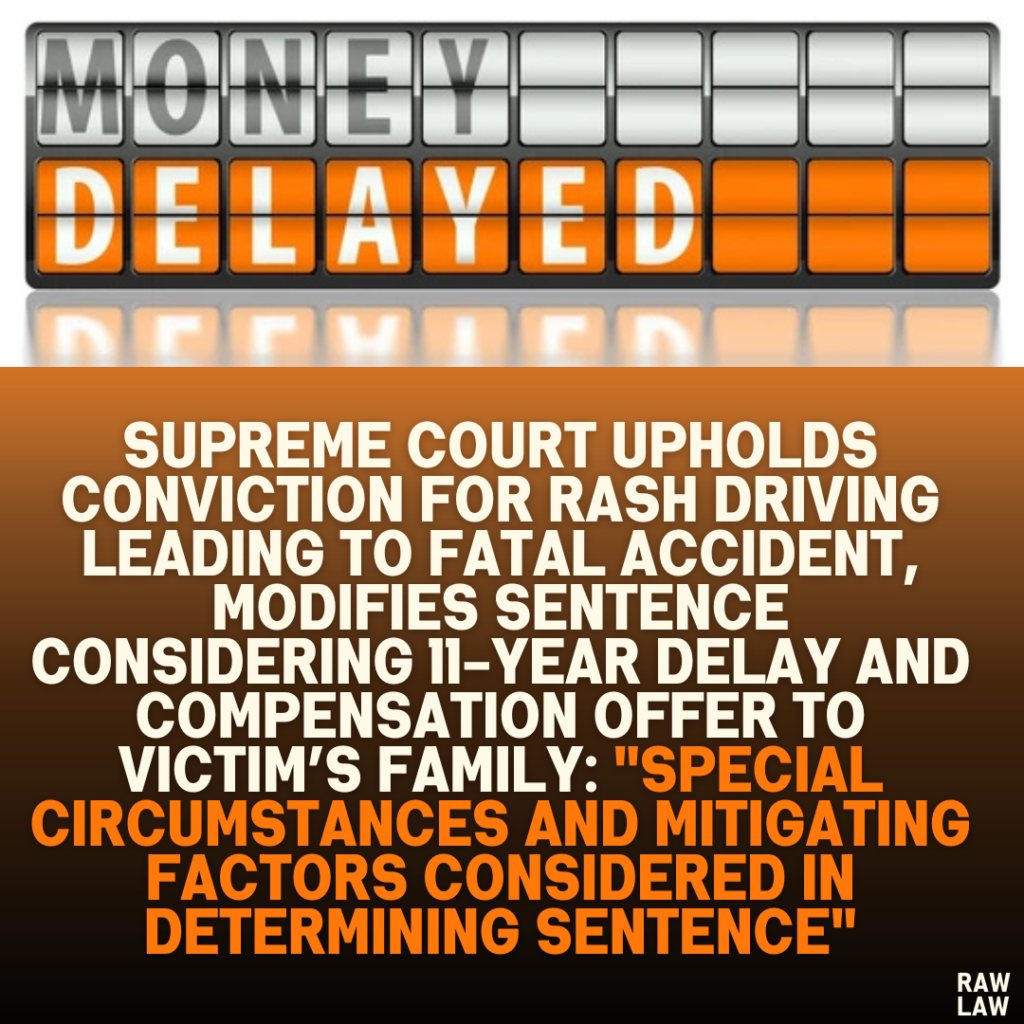Court’s Decision:
The Supreme Court upheld the appellant’s conviction under Sections 279 (rash driving) and 304(A) (causing death by negligence) of the Indian Penal Code (IPC), as initially established by the trial court. However, the Court modified the sentence, acknowledging the lengthy period that had passed since the incident (11 years), the appellant’s behavior during the proceedings, and the offer of compensation to the deceased’s family. The three-month imprisonment imposed by the High Court and the fines imposed earlier were set aside, with the appellant ordered to pay Rs. 1,00,000 as compensation to the deceased’s family.
Facts:
The incident in question occurred on 09.01.2013, when the appellant, while driving his lorry on the Nilakottai to Madurai road, struck both six cows and the deceased, Karthik, resulting in his death. The eyewitnesses confirmed that the appellant was driving in a rash and negligent manner, which directly led to the accident. An FIR was filed under Sections 279 and 304(A) IPC, as well as other provisions related to the illegal transportation of river sand under the Mines and Minerals (Development and Regulation) Act. The appellant was later acquitted of charges under the Mines and Minerals Act. At the trial court, the appellant was convicted and sentenced, a decision upheld by the Appellate Court. On revision, the High Court modified the sentence to three months of simple imprisonment.
Issues:
- Whether the appellant’s conviction for rash and negligent driving resulting in death was appropriate.
- Whether the sentence imposed was fair and justified, considering the time elapsed and the appellant’s conduct post-incident.
Petitioner’s Arguments:
The petitioner (appellant) argued that while the rash driving was responsible for the fatal accident, several factors should be taken into account when determining the sentence. These included the passage of 11 years since the incident, during which the appellant had remained on bail, and his offer to deposit Rs. 1,00,000 as compensation to the deceased’s family. Furthermore, the appellant contended that the incident involved the negotiation of a large number of cattle on the road, which may have contributed to the tragic outcome. Thus, the petitioner sought a reduction in the sentence, advocating for the compensation payment as a more suitable form of reparation.
Respondent’s Arguments:
The respondent (State) argued that the appellant’s actions were undoubtedly rash and led directly to the death of Karthik and the destruction of valuable property (the cows). The respondent contended that the appellant’s conviction under Sections 279 and 304(A) IPC was appropriate and should not be disturbed. As for the sentence, the respondent maintained that the original sentence, including imprisonment and fines, was just given the nature of the crime.
Analysis of the Law:
The Supreme Court examined Sections 279 and 304(A) IPC, which deal with offenses related to rash and negligent driving causing death or injury. The Court emphasized that the conviction for causing death by negligence was well-founded, as the appellant’s driving was described as rash and negligent by multiple eyewitnesses. Moreover, the Court referenced Section 357(3) of the Criminal Procedure Code (Cr.P.C.), which allows courts to direct compensation to the victim’s family in cases where loss of life has occurred due to negligence. This section was relevant in determining that the compensation offered by the appellant should be considered as part of the remedy for the victim’s family.
Precedent Analysis:
Although no specific precedents were cited in the judgment, the Court’s approach mirrored previous decisions where sentences were modified based on special circumstances, such as the time elapsed since the incident and the conduct of the appellant. The use of Section 357(3) Cr.P.C. to direct compensation was also consistent with prior rulings in similar cases where compensation was considered an appropriate remedy in cases of negligent driving.
Court’s Reasoning:
The Court was clear in its assessment of the appellant’s conviction, noting that the evidence against the appellant was consistent and showed that his driving was both rash and negligent. The conviction under Sections 279 and 304(A) IPC was upheld. However, when it came to the sentence, the Court took into account the long delay of 11 years since the incident, the appellant’s good behavior during this period, and his offer of compensation to the family of the deceased. Additionally, the appellant had been on bail throughout, which the Court noted as a mitigating factor. Despite the appellant’s conviction being maintained, the Court found it appropriate to alter the sentence to account for these special facts.
Conclusion:
The conviction under Sections 279 and 304(A) IPC was upheld, but the sentence was modified. The Court set aside the three-month imprisonment and fines previously imposed and instead ordered that the Rs. 1,00,000 deposited by the appellant be given to the deceased’s mother as compensation. This payment was made in exercise of the powers conferred by Section 357(3) of the Cr.P.C. to compensate the family for the loss caused by the appellant’s negligent actions. The amount would be transferred to the District Court, and the Court directed that it be handed over to the deceased’s mother after verifying her identity.
Implications:
This decision highlights the importance of considering mitigating factors, such as the passage of time and the appellant’s actions after the incident, when determining sentences in cases of negligent driving. It also demonstrates the Court’s willingness to modify sentences in light of special circumstances, such as the availability of compensation for the victim’s family. The ruling reinforces the application of Section 357(3) Cr.P.C. to ensure victims or their families are compensated for the loss caused by criminal actions. The case sets a precedent for how courts may balance justice for the victim with rehabilitation and leniency towards the accused under certain conditions.
